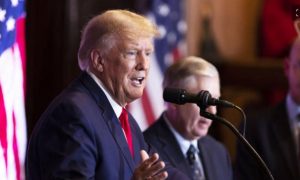As the political brinkmanship over the debt limit continues, Biden Administration officials are being asked whether they’d invoke a controversial legal theory under the 14th Amendment that may allow the President to bypass Congress and raise the nation’s debt limit without Republican approval.
Read More:– Oil climbs as recession fears begin to fade
The theory, which previous administrations had ruled out, builds on Section 4 of the 14th Amendment to argue that it would be unconstitutional for the U.S. to fail to make payments even if the debt limit isn’t raised, effectively challenging the debt limit on legal grounds. But doing so for the first time in U.S. history could have serious ramifications for the economy and elicit a host of legal challenges that could take months to sort out, leaving the country in a fiscal crisis in the meantime.
Read More:- Why Fisker Stock Leaped Nearly 7% Higher Today
The 14th Amendment states that “the validity of the public debt, authorized by law…shall not be questioned.” Some legal scholars argue that this clause gives the Treasury Department the ability to keep borrowing money past the current $31.4 trillion debt limit that requires congressional approval to raise or lift—which the country hit on Jan. 19. “It’s a constitutionally tenable argument—and a strong argument—to solve the current debt ceiling crisis,” says Rebecca Zietlow, a professor at the University of Toledo College of Law whose research focuses on the 14th Amendment.
Read More:– Small Business Owners Embrace Managed IT Services for Cybersecurity Confidence
Yellen on Sunday said invoking the 14th Amendment to get around the debt ceiling and continue borrowing money to pay the nation’s bills would risk a “constitutional crisis,” downplaying the idea that the legal theory would solve the looming problem. “What to do if Congress fails to meet its responsibility? There are simply no good options, and the ones that you’ve listed are among the not good options,” Yellen told ABC News when asked whether the Biden Administration was considering using the 14th Amendment. She has said the U.S. could default as soon as June 1.
Read More:-Biden, Republicans spar over veterans’ benefits amid debt ceiling showdown
Even most legal experts in favor of the 14th Amendment argument say it is perhaps best viewed as an emergency, last-ditch option to ward off the threat of a default. Joe Biden said as much on Friday, noting that he was not yet ready to invoke the 14th Amendment, although he left open the possibility of such a move in the future. “I’ve not gotten there yet,” the President told MSNBC in an interview. But as the U.S. inches closer to default, pressure is mounting on the Biden Administration to decide if it makes legal—and economic—sense to take up the argument.
Read More:– Wall Street primary wide open as DeSantis stumbles
Biden is set to meet with House Speaker Kevin McCarthy and other top congressional leaders at the White House on Tuesday to discuss fiscal policy, though it’s unclear if any compromise will be made to avoid a default without using this untested legal theory.
Other legal scholars contend the Biden Administration can ignore the debt limit without making a constitutional argument, grounding the move instead in separation of powers concerns. Neil Buchanan, a University of Florida law professor and the author of The Debt Ceiling Disasters, a 2011 book that argues the debt ceiling forces the President to choose between illegal and unconstitutional options, says he would suggest Biden ignore the statutory limit on borrowing until Congress either raises or abolishes it. “It may be seen as a power grab by Biden, but this is the least unconstitutional option,” he says. Laurence Tribe, the Harvard law professor and prominent constitutional scholar, wrote a New York Times op-ed on Sunday arguing a similar position—that Biden should contend that Congress has no right to tell the President to ignore the spending laws it approved, which he described as “ignoring one law in order to uphold every other.”
Read More:– For Only the 4th Time in 50 Years, This Banking Metric Is Forecasting a Big Move in the Stock Market
It remains unclear what the Treasury Department would do if Congress—or the President—does not raise the limit in time. But others have argued that the statutory borrowing limit is binding, so any attempt to ignore it on any grounds would draw an immediate legal challenge that would most likely rise to the Supreme Court. But court cases “move at a much slower pace than the political and economic reaction,” Buchanan says. “It could take weeks or months for this to work its way through the courts.”
Read More:– Renewed Banking Fears Drag Equities Lower Ahead of Jobs Report
This isn’t the first time people have wondered about using the Constitution as a way out of a debt ceiling fight. When Biden was Vice President, former President Barack Obama closed the door on a 14th Amendment argument when confronted with a similar situation in 2011. “I have talked to my lawyers,” Obama said at the time. “They are not persuaded that that is a winning argument.”

























